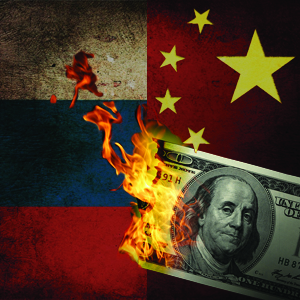Russia and China unite to fight against the dollar as the main reserve currency.
 It seems that even vanishing planes and Justin Bieber cannot keep Russia out of the headlines. Fresh off of their controversial hosting of the Olympics and a military intervention in neighboring Ukraine, Russia is now making news by joining China in actively challenging the U.S. dollar as the world’s reserve currency.
It seems that even vanishing planes and Justin Bieber cannot keep Russia out of the headlines. Fresh off of their controversial hosting of the Olympics and a military intervention in neighboring Ukraine, Russia is now making news by joining China in actively challenging the U.S. dollar as the world’s reserve currency.
According to The Voice of Russia, American trader Russ Winters has claimed that Russia and China have given up the U.S. dollar in most cases involving international payments and have decided to strengthen their own currencies by buying up gold.
Mr. Winters, as reported by The Voice of Russia, believes these two world powers are planning to “gradually raise the convertibility of both the rouble (Russia’s currency) and the yuan (China’s currency) and to increase their role in international trade, which in time will make it possible to present them as reserve currencies. The USA, where the level of the state debt is approaching 110 percent of the Gross Domestic Product (GDP), will simply not be able to respond to this challenge.”
Mr. Winters may feel that this is a deliberate ploy by Beijing and Moscow to replace the U.S. dollar as the world’s reserve currency, but other analysts believe that this may only be a consequence of a struggling U.S. economy. It is no secret that the dollar has become less solvent over the past few years and some experts predict that the dollar could devalue twice in the coming three years. Russia and China may have seen similar reports and now they are simply protecting their own currencies by converting their reserves into gold.
Also, Russia and China are not just competing with the U.S. dollar for the coveted reserve currency title. The euro and the British pound are also very strong. Ivan Fomenko, the head of the Trustee Management Department at Absolyut Bank, lays out the criteria that must be met to become a reserve currency:
“First, the full openness of the currency market and the convertibility of this currency. Second, the reliability and openness of the financial institutions of countries which would like their currencies to heave a reserve currency status. Third, the consistency of actions of the monetary authorities. And fourth, which is the main thing here, the willingness of the companies to sign agreements with the yuan [or another currency] as the basic currency.”
The dollar may be struggling, but it still has earned the trust of international business, something the rouble and the yuan are still trying to accomplish.
Nevertheless, Russia and China have each made some public challenges to the U.S. dollar recently, lending some credence to Mr. Winters’ claim. In the past five years, China has stated that that domination of the one currency in the world may cause “the spread of a crisis.” In that time Russia has also pushed for an increase in the number of reserve currencies and, not surprisingly, proposed the rouble as one such possibility. In 2013, China released a statement following the U.S. government shut-down asking the world to “de-Americanize” and a Russian politician submitted a bill to parliament that would ban the use or possession of the U.S. dollar.
Whether these actions will lead to new or additional reserve currencies remains to be seen. What is clear, however, is that the U.S. dollar is under fire like it has never been before.

